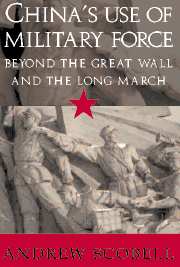Book contents
- Frontmatter
- Contents
- Preface
- China's Use of Military Force
- 1 Introduction
- Part I Layers of Culture
- Part II Use of Force in the Mao Era
- 4 Lips and Teeth: China's Decision to Intervene in Korea
- 5 “Support the Left”: PLA Intervention in the Cultural Revolution
- Part III Use of Force in the Deng Era
- Part IV Use of Force in the Post-Deng Era
- Notes
- Bibliography
- Index
5 - “Support the Left”: PLA Intervention in the Cultural Revolution
Published online by Cambridge University Press: 29 July 2009
- Frontmatter
- Contents
- Preface
- China's Use of Military Force
- 1 Introduction
- Part I Layers of Culture
- Part II Use of Force in the Mao Era
- 4 Lips and Teeth: China's Decision to Intervene in Korea
- 5 “Support the Left”: PLA Intervention in the Cultural Revolution
- Part III Use of Force in the Deng Era
- Part IV Use of Force in the Post-Deng Era
- Notes
- Bibliography
- Index
Summary
THE intervention of the People's Liberation Army (PLA) in the People's Republic of China (PRC) in 1967 has received considerable attention by scholars. The use of PLA units during the Great Proletarian Cultural Revolution (CR) (1966–9) has been viewed as a negative step that proved detrimental to both Chinese politics and the PLA itself.
Chinese scholars have not mirrored the attention given by foreign analysts to the extensive intervention of the PLA in the internal affairs of China during the Cultural Revolution. Indeed, official Chinese documents and histories tend to ignore the PLA's significant domestic role during the Cultural Revolution. In one sense, the lack of treatment is nothing short of remarkable since there is widespread consensus that military intervention literally rescued China from the brink of civil war and complete collapse. The price of this rescue was military rule (jun guan) at the local and provincial levels throughout China. However, the PLA never assumed control over the operations of the central government in Beijing. The dearth of coverage of this aspect of a troubled period in PRC history reflects the extreme sensitivity of China's political leaders to the domination – real or perceived – of the military vis-à-vis the civilian (party and state) authorities. Despite this sensitivity, in no way can this intervention be considered a military coup d'etat. The PLA intervened only at the behest of China's top political leader, Mao Zedong, and never took control of the national government.
- Type
- Chapter
- Information
- China's Use of Military ForceBeyond the Great Wall and the Long March, pp. 94 - 116Publisher: Cambridge University PressPrint publication year: 2003



